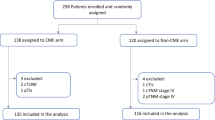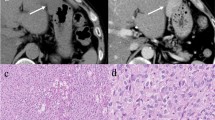Abstract
PURPOSE: This study is designed to review a carcinoembryonic antigen (CEA)-driven postoperative protocol designed to identify patients suitable for curative reresection when recurrent colorectal cancer is identified. METHODS: A total of 285 patients who were operated on for colon or rectal carcinoma between 1981 and 1985 were evaluated (with CEA levels) every two months for the first two years, every three months for the third year, every six months for years 4 and 5, and annually thereafter. CEA levels above 5 μg were considered abnormal and were evaluated with diagnostic imaging and/or endoscopy. RESULTS: Follow-up was available for 280 patients (98.2 percent). Distribution of patients by Astler-Coller was: A, 14 percent; B1 20 percent; B2, 39 percent; C1, 5 percent; C2, 21 percent. There were 62 of 280 patients (22 percent) who developed elevated CEA levels, with 44 patients who demonstrated clinical or radiographic evidence of recurrence. Eleven patients were selected for surgery with curative intent (4 hepatic resections, 1 pulmonary wedge resection, 2 abdominoperineal resections, 2 segmental bowel resections, and 2 cranial metastasectomies). Three of 11 patients (27 percent) benefited and have disease-free survivals greater than 60 months. Of the 223 patients without elevated CEA, 22 (9.9 percent) had recurrent cancer without any survivors. Overall, 3 of 285 patients (1.1 percent) were cured as a result of CEA follow-up. CONCLUSION: CEA-driven surgery is useful in selected patients and can produce long-term survivors.
Similar content being viewed by others
References
Cooper EH, O'Quigley J. Colorectal cancer: biochemical markers. Recent results. Cancer Res 1982;83:67–76.
Steele G Jr, Ellenberg S, Ramming K,et al. CEA monitoring among patients in multi-institutional adjuvant G. I. therapy protocols. Ann Surg 1982;196:162–9.
Go VL, Zamcheck N. The role of tumor markers in the management of colorectal cancer. Cancer 1982;50:2618–23.
Maceratini R, Di Vona P, Senati E, Tonelli F. Preoperative CEA and prognosis in surgery. Minerva Chir 1982;37:1779–83.
Hohenberger P, Schlag PM, Gerneth T, Herfarth C. Pre- and postoperative carcinoembryonic antigen determinations in hepatic resection for colorectal metastases: predictive value and implications for adjuvant treatment based on multivariate analysis. Ann Surg 1994;219:135–43.
Moertel CG, Fleming TR, Macdonald JS, Haller DG, Laurie JA, Tangen C. An evaluation of the carcinoembryonic antigen (CEA) test for monitoring patients with resected colon cancer. JAMA 1993;270:943–7.
Wang JY, Tang R, Chiang JM. Value of carcinoembryonic antigen in the management of colorectal cancer. Dis Colon Rectum 1994;37:272–7.
Fletcher RH. Carcinoembryonic antigen. Ann Intern Med 1986;104:66–73.
Kievit J, van de Velde CJ. Utility and cost of carcinoembryonic antigen monitoring in colon cancer follow-up evaluation: a Markov analysis. Cancer 1990;65:2580–7.
Bruinvels DJ, Stiggelbout AM, Kievit J, van Houwelingen HC, Habbema JD, van deVelde CJ. Follow-up of patients with colorectal cancer: a meta-analysis. Ann Surg 1994;219:174–82.
Vignati PV, Roberts PL. Preoperative evaluation and postoperative surveillance for patients with colorectal carcinoma. Surg Clin North Am 1993;73:67–84.
Kelly CJ, Daly JM. Colorectal cancer: principles of postoperative follow-up. Cancer 1992;70:1397–408.
Turk PS, Wanebo HJ. Results of surgical treatment of nonhepatic recurrence of colorectal carcinoma. Cancer 1993;71:4267–77.
Hida J, Yasutomi M, Shindoh K,et al. Second-look operation for recurrent colorectal cancer based on carcinoembronic antigen and imaging techniques. Dis Colon Rectum 1996;39:74–9.
Astler VB, Coller FA. The prognostic significance of direct extension of carcinoma of the colon and rectum. Ann Surg 1954;139:846–52.
Denstman F, Rosen L, Khubchandani IT, Sheets JA, Stasik JJ, Riether RD. Comparing predictive decision rules in postoperative CEA monitoring. Cancer 1986;58:2089–95.
Wangensteen OH, Lewis FJ, Arhelger SW,et al. An interim report upon the “second look” procedure for cancer of the stomach, colon and rectum and for limited intraperitoneal carcinosis. Surg Gynecol Obstet 1954;99:257–67.
Nelson RL. Screening of average-risk individuals for colorectal cancer and postoperative evaluation of patients with colorectal cancer. Surg Clin North Am 1996;76:35–45.
Martin EW Jr, Cooperman M, Carey LC, Minton JP. Sixty second-look procedures indicated primarily by rise in serial carcinoembryonic antigen. J Surg Res 1980;28:389–94.
Beart RW Jr, Metzger PP, O'Connell MJ, Schutt AJ. Postoperative screening of patients with carcinoma of the colon. Dis Colon Rectum 1981;24:585–8.
Ohlsson B, Breland U, Ekberg H, Graffner H, Tranberg K-G. Follow-up after curative surgery for colorectal carcinoma: randomized comparison with no follow-up. Dis Colon Rectum 1995;38:619–26.
McCall JL, Black RB, Rich CA,et al. The value of serum carcinoembryonic antigen in predicting recurrent disease following curative resection of colorectal cancer. Dis Colon Rectum 1994;37:875–81.
Virgo KS, Vernava AM, Longo WE, McKirgan LW, Johnson FE. Cost of patient follow-up after potentially curative colorectal cancer treatment. JAMA 1995;273:1837–41.
Goldenberg DM, Neville AM, Carter AC,et al. Carcinoembryonic antigen: its role as a marker in the management of cancer. Summary of an NIH consensus statement. Carcinoembryonic antigen: its role as a marker in the management of cancer. BMJ (Clin Res Ed) 1981;282:373–5.
Rosen L, Stasik JJ Jr, Reed JF III, Olenwine JA, Aronoff JS, Sherman D. Variations in colon and rectal surgical mortality: comparison of specialities with a statelegislated database. Dis Colon Rectum 1996;39:129–35.
Author information
Authors and Affiliations
Additional information
Read at the meeting of The American Society of Colon and Rectal Surgeons, Seattle, Washington, June 9 to 14, 1996.
About this article
Cite this article
Lucha, P.A., Rosen, L., Olenwine, J.A. et al. Value of carcinoembryonic antigen monitoring in curative surgery for recurrent colorectal carcinoma. Dis Colon Rectum 40, 145–149 (1997). https://doi.org/10.1007/BF02054978
Issue Date:
DOI: https://doi.org/10.1007/BF02054978




